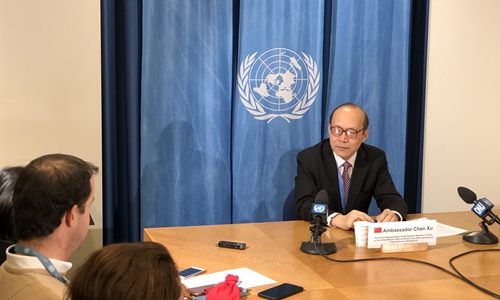The US is politicalizing the election of the next director general for World Intellectual Property Organization (WIPO) by attacking the Chinese candidate and its interference will jeopardize the independence of the professional competition, Ambassador Chen Xu, China’s permanent representative to the United Nations Office in Geneva and other international organizations in Switzerland, told a press conference on Wednesday in Geneva.
The WIPO, an agency under the UN that specializes in global IP services, policies and cooperation, will hold an election on March 4 for its next director general to replace Francis Gurry of Australia, whose second six-year term will expire in September.
China has nominated Wang Binying, who has spent 28 years in the agency and has been serving as a deputy director general since 2008.
However, the US is leading a campaign to attack China in the field of intellectual property rights as well as Wang’s nomination.
“As the WIPO is mainly in charge of the international cooperation of intellectual property rights protection and the administration of international patents, it is natural for China, the world’s leading patent applicant to nominate its candidate,” Chen told a press briefing on Wednesday at the United Nations Office in Geneva.
Wang is currently WIPO’s deputy director general and highly competent, and has been working with the organization for nearly 30 years. She is familiar with the running of this organization. She enjoys great respect, Chen said.
As a determined woman and a good communicator, she is able to find solutions by coordinating different concerns of member states. Wang’s unique and rich work experience makes her the strongest candidate for the new director general, according to Chen.
China’s nomination meets the expectations of many colleagues for the more outstanding female leaders to chair the international organizations and promote gender parity.
“The story could be very much simpler. It should be a fair competition among professionals,” Chen said, noting that the US is turning this election into a political game. It has no candidate of its own, yet it tries every means to block Wang’s nomination.
It is said that the US has warned some of the small countries not to vote to the Chinese candidate or they may face consequences such as weaker relations with the US, Chen noted, saying that as far as he knows, some WIPO members have expressed their strong resentment to US pressure.
Many of the member states are calling for an election free from political interference and they worried the US interference in the election will jeopardize the independence of the election.
In response to some foreign media’s questions on China’s position in nominating a candidate of the IPR international organization, Chen said that China needs to catch up with the other parts of the world in the IPR field, and China has done a lot of work in recent years.
According to a release from the Permanent Mission of the People’s Republic of China to the UN Office in Geneva and the other international organizations in Switzerland, Chinese society has firmly established the concept that “protecting intellectual property is protecting innovation.”
In terms of legislation, China has published a series of important documents, such as the “Opinions on Strengthening the Protection of Intellectual Property Rights,” and “Several Opinions on Building a Powerful Intellectual Property Nation under New Conditions.”


